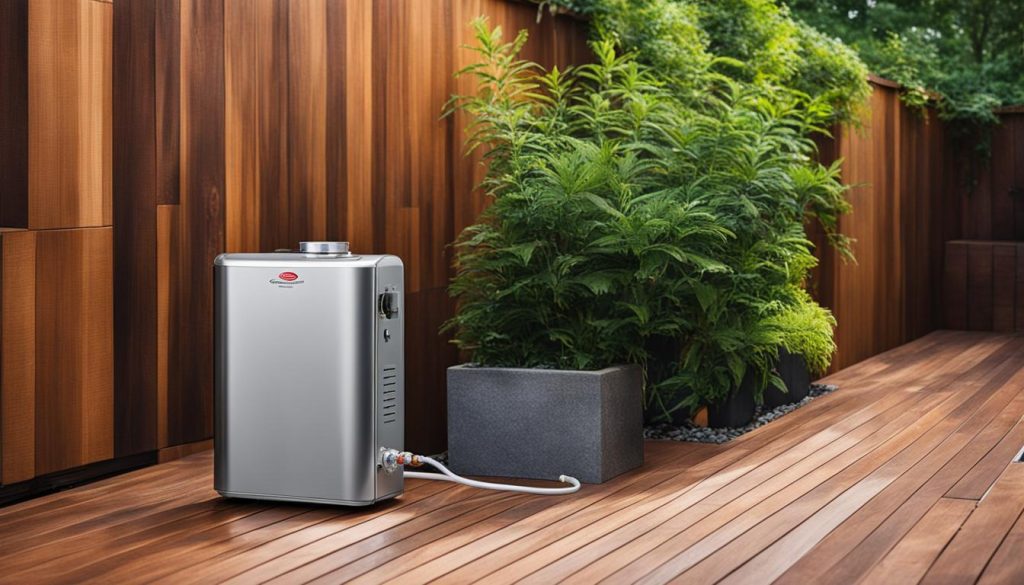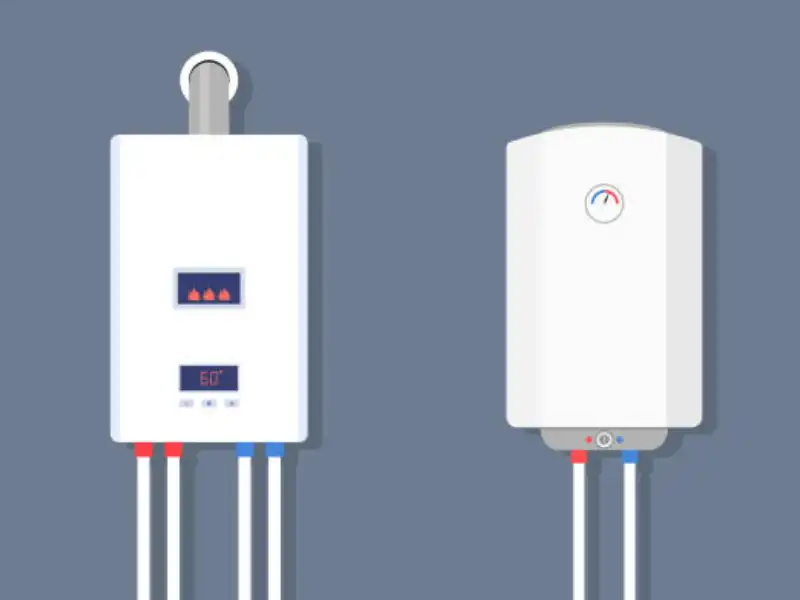The Ultimate Guide to a Portable Hot Water Heater

Are you tired of cold showers while camping or dealing with unreliable hot water during outdoor events? A portable hot water heater could be the perfect solution. These compact and efficient devices provide on-demand hot water wherever you need it. This comprehensive guide will explore the benefits, types, and key considerations when choosing a portable hot water heater.
What is a Portable Hot Water Heater?
A portable hot water heater is a compact device that heats water on demand without needing a large storage tank. These units are designed for mobility and can be easily transported to various locations, making them ideal for outdoor activities, off-grid living, or emergencies.
Portable hot water heaters typically use propane or electricity as fuel. They heat water instantly as it flows through the unit, providing a continuous hot water supply for showers, washing dishes, or other needs.
Call-out Box 1: Did You Know? Portable hot water heaters can heat water up to 140°F (60°C) in just seconds, providing instant hot water for various applications. This rapid heating capability makes them an excellent choice for outdoor enthusiasts and emergency preparedness kits.
Benefits of Portable Hot Water Heaters
Endless Hot Water Supply
One of the main advantages of a portable hot water heater is the endless supply of hot water. Unlike traditional tank-based systems, which can run out of hot water during heavy usage, portable units heat water on demand. This means you’ll never have to worry about running out of hot water, even if multiple people need to shower.
Energy Efficiency
Portable hot water heaters are highly energy-efficient. They only heat water when needed, eliminating standby energy losses associated with storage tank systems. This can result in significant energy savings over time, especially if you frequently use hot water in outdoor settings.
Space-Saving Design
The compact size of portable hot water heaters makes them perfect for situations where space is limited. They can easily fit in the trunk of a car, a backpack, or a small storage area. This space-saving design is particularly beneficial for camping trips, RVs, tiny homes, or outdoor events where a traditional water heater would be impractical.
Versatility
Portable hot water heaters offer incredible versatility. They can be used in a wide range of settings, including:
- Camping and hiking trips
- Outdoor events and festivals
- Job sites and construction areas
- Emergencies and power outages
- Off-grid living and cabins
Whether you need hot water for a shower after a long hike or to wash dishes at a remote cabin, a portable hot water heater can provide it.
Types of Portable Hot Water Heaters

There are two main types of portable hot water heaters: propane-powered and electric. Each type has its own advantages and considerations.
Propane Portable Hot Water Heaters
Propane-powered units are the most common type of portable hot water heater. They use propane gas as a fuel source, which is readily available at most hardware stores and camping supply shops. Propane heaters are known for quick heating times and high water flow rates.
Advantages of propane portable hot water heaters include:
- Fast heating times
- High water flow rates
- No need for an electrical power source
- Ideal for off-grid and remote locations
However, it’s important to note that propane heaters require adequate ventilation to prevent carbon monoxide buildup. They also need a steady propane supply, so you’ll need to carry extra fuel tanks for extended use.
Electric Portable Hot Water Heaters
Electric portable hot water heaters are powered by electricity from a standard outlet or a generator. They are quieter and produce no emissions, making them suitable for indoor use or areas with strict noise and air quality regulations.
Advantages of electric portable hot water heaters include:
- Quiet operation
- No emissions or need for ventilation
- Easy to use and maintain
- Ideal for indoor settings or areas with electricity access
The main drawback of electric units is their reliance on a power source. They may not be suitable for remote locations without electricity access or during power outages.
Choosing the Right Portable Hot Water Heater
When selecting a portable hot water heater, consider the following factors to ensure you get the best unit for your needs:
Fuel Type
Decide whether a propane or electric unit is more suitable for your intended use. Consider the availability of fuel sources, ventilation requirements, and the locations where you’ll be using the heater.
Water Flow Rate
Look for a unit with a water flow rate that meets your needs. A higher flow rate means more hot water output, which is important if multiple people will be using the heater simultaneously. However, higher flow rates may also consume fuel or electricity more quickly.
Temperature Control
Choose a portable hot water heater with adjustable temperature settings. This allows you to customize the water temperature to your preferences and conserve energy when lower temperatures are sufficient.
Portability and Size
Consider the size and weight of the unit, especially if you plan to carry it on hiking or camping trips. Look for heaters with compact designs and carrying handles for easy transportation.
Durability and Weather Resistance
Opt for a portable hot water heater with durable construction and weather-resistant features, especially if you’ll use it outdoors. Look for units with rugged casings, corrosion-resistant materials, and weatherproof electrical connections.
Safety Features
When choosing a portable hot water heater, prioritize safety. Look for units with automatic shut-off mechanisms, overheat protection, and flame failure detection (for propane units). These features help prevent accidents and ensure safe operation.
Comparison of Propane vs. Electric Portable Hot Water Heaters

To help you make an informed decision, here’s a comparison table of propane and electric portable hot water heaters:
| Feature | Propane Heaters | Electric Heaters |
|---|---|---|
| Fuel Source | Propane gas | Electricity |
| Heating Speed | Fast | Moderate |
| Water Flow Rate | High | Moderate |
| Portability | Highly portable | Portable, but requires power source |
| Outdoor Use | Excellent | Limited by power availability |
| Indoor Use | Requires ventilation | Safe for indoor use |
| Noise Level | Moderate | Low |
| Emissions | Produces emissions | No emissions |
| Maintenance | Regular cleaning and propane refills | Minimal maintenance |
| Cost | Higher upfront cost, ongoing fuel expenses | Lower upfront cost, ongoing electricity expenses |
Tips for Using a Portable Hot Water Heater
To get the most out of your portable hot water heater, follow these tips:
- Read the manufacturer’s instructions carefully before use and follow all safety guidelines.
- Ensure proper ventilation when using propane units to prevent carbon monoxide buildup.
- Regularly maintain and clean your heater to ensure optimal performance and longevity.
- Use a water pressure regulator to protect the unit from excessive water pressure.
- Drain the heater completely after each use to prevent mineral buildup and corrosion.
- When not in use, store your portable hot water heater in a dry, protected area to prevent damage from the elements.
- Check for leaks in propane connections before each use to ensure safety.
- Consider using a water filter with your portable hot water heater to improve water quality, especially when using untreated water sources.
- Keep spare parts and tools on hand for quick repairs or maintenance in the field.
- Practice using your portable hot water heater at home before taking it on a trip to familiarize yourself with its operation and quirks.
Call-out Box 2: Pro Tip: When using a portable hot water heater for camping or outdoor events, bring a collapsible water container or bucket. This allows you to collect and store hot water for later use, such as washing dishes or taking a warm sponge bath, without constantly running the heater.
Environmental Considerations
As outdoor enthusiasts and users of portable hot water heaters, it’s essential to consider the environmental impact of our choices. Here are some eco-friendly tips:
- Choose energy-efficient models to minimize fuel consumption and emissions.
- Use biodegradable soaps and detergents when washing with hot water outdoors.
- Collect and properly dispose of greywater to protect natural water sources.
- Consider solar-powered options for heating water in sunny locations.
- Opt for reusable propane tanks instead of disposable ones to reduce waste.
Future Innovations in Portable Hot Water Heaters
The portable hot water heater market continues to evolve, with manufacturers focusing on improving efficiency, reducing environmental impact, and enhancing user experience. Some exciting developments to watch for include:
- Integration of smart technology for remote control and monitoring
- Hybrid models that combine multiple fuel sources for increased versatility
- Improved battery-powered options for truly off-grid use
- More compact and lightweight designs for easier transportation
- Enhanced safety features and fail-safe mechanisms
As technology advances, portable hot water heaters will become even more efficient, user-friendly, and environmentally conscious.
End Notes
Portable hot water heaters offer a convenient and efficient solution for providing hot water in various outdoor and off-grid situations. By understanding the different types, features, and considerations, you can choose the right unit for your needs and enjoy the comfort of hot water wherever your adventures take you.
Whether you’re an avid camper, a frequent traveler, or someone who values preparedness, a portable hot water heater can be a game-changing addition to your gear. With proper selection, use, and maintenance, these versatile devices can provide years of reliable service, ensuring you always have access to hot water when you need it most.
As you explore the world of portable hot water heaters, remember to prioritize safety, efficiency, and environmental responsibility. With the right approach, you can enjoy hot water in even the most remote locations while minimizing your impact on the natural world around you.

